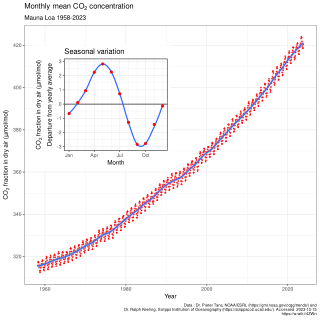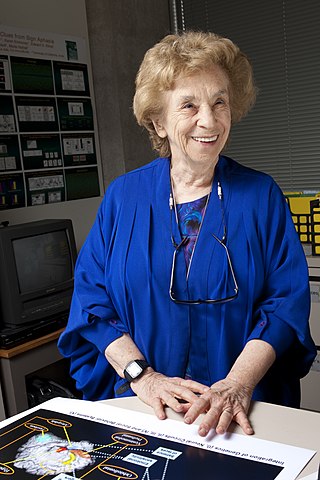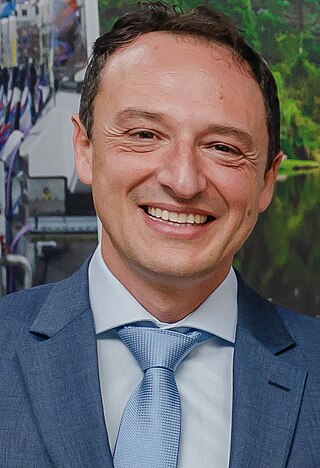
The Salk Institute for Biological Studies is a scientific research institute located in the La Jolla community of San Diego, California, U.S. The independent, non-profit institute was founded in 1960 by Jonas Salk, the developer of the polio vaccine; among the founding consultants were Jacob Bronowski and Francis Crick. Construction of the research facilities began in spring of 1962. The Salk Institute consistently ranks among the top institutions in the US in terms of research output and quality in the life sciences. In 2004, the Times Higher Education Supplement ranked Salk as the world's top biomedicine research institute, and in 2009 it was ranked number one globally by ScienceWatch in the neuroscience and behavior areas.

Vilayanur Subramanian Ramachandran is an Indian-American neuroscientist. He is known for his wide-ranging experiments and theories in behavioral neurology, including the invention of the mirror box. Ramachandran is a distinguished professor in UCSD's Department of Psychology, where he is the director of the Center for Brain and Cognition.

Patricia Smith Churchland is a Canadian-American analytic philosopher noted for her contributions to neurophilosophy and the philosophy of mind. She is UC President's Professor of Philosophy Emerita at the University of California, San Diego (UCSD), where she has taught since 1984. She has also held an adjunct professorship at the Salk Institute for Biological Studies since 1989. She is a member of the Board of Trustees Moscow Center for Consciousness Studies of Philosophy Department, Moscow State University. In 2015, she was elected a Fellow of the American Academy of Arts & Sciences. Educated at the University of British Columbia, the University of Pittsburgh, and Somerville College, Oxford, she taught philosophy at the University of Manitoba from 1969 to 1984 and is married to the philosopher Paul Churchland. Larissa MacFarquhar, writing for The New Yorker, observed of the philosophical couple that: "Their work is so similar that they are sometimes discussed, in journals and books, as one person."

Terrence William Deacon is an American neuroanthropologist. He taught at Harvard for eight years, relocated to Boston University in 1992, and is currently Professor of Anthropology and member of the Cognitive Science Faculty at the University of California, Berkeley.
Terrence Joseph Sejnowski is the Francis Crick Professor at the Salk Institute for Biological Studies where he directs the Computational Neurobiology Laboratory and is the director of the Crick-Jacobs center for theoretical and computational biology. He has performed pioneering research in neural networks and computational neuroscience.

Roger Randall Dougan Revelle was a scientist and scholar who was instrumental in the formative years of the University of California, San Diego and was among the early scientists to study anthropogenic global warming, as well as the movement of Earth's tectonic plates. UC San Diego's first college is named Revelle College in his honor.
Paul Montgomery Churchland is a Canadian philosopher known for his studies in neurophilosophy and the philosophy of mind. After earning a Ph.D. from the University of Pittsburgh under Wilfrid Sellars (1969), Churchland rose to the rank of full professor at the University of Manitoba before accepting the Valtz Family Endowed Chair in Philosophy at the University of California, San Diego (UCSD) and joint appointments in that institution's Institute for Neural Computation and on its Cognitive Science Faculty.

The University of California San Diego School of Medicine is the graduate medical school of the University of California, San Diego, a public land-grant research university in La Jolla, California. It was the third medical school in the University of California system, after those established at UCSF and UCLA, and is the only medical school in the San Diego metropolitan area. It is closely affiliated with the medical centers that are part of UC San Diego Health.
Jeffrey Locke Elman was an American psycholinguist and professor of cognitive science at the University of California, San Diego (UCSD). He specialized in the field of neural networks.
The Science Network (TSN) is a non-profit virtual forum dedicated to science and its impact on society. It was initially conceived in 2003 by Roger Bingham and Terry Sejnowski as a cable science TV network modeled on C-SPAN. TSN later became a global digital platform hosting videos of lectures from scientific meetings and long form one-on-one conversations with prominent scientists and communicators of science, including Neil deGrasse Tyson, V.S. Ramachandran, Helen S. Mayberg, and Barbara Landau. TSN has also sponsored and co-sponsored scientific forums, such as Stem cells: science, ethics and politics at the crossroads, held at the Salk Institute in 2004 and the Beyond Belief conference series.
Ajit Varki is a physician-scientist who is distinguished professor of medicine and cellular and molecular medicine, founding co-director of the Glycobiology Research and Training Center at the University of California, San Diego (UCSD), and founding co-director of the UCSD/Salk Center for Academic Research and Training in Anthropogeny (CARTA). He is also executive editor of the textbook Essentials of Glycobiology and distinguished visiting professor at the Indian Institute of Technology in Madras and the National Center for Biological Sciences in Bangalore. He is a specialist advisor to the Human Gene Nomenclature Committee.

Helen J. Neville was a Canadian psychologist and neuroscientist known internationally for her research in the field of human brain development.

Ursula Bellugi was an American cognitive neuroscientist. She was a Distinguished Professor Emerita and director of the Laboratory for Cognitive Neuroscience at the Salk Institute in La Jolla, California. She is known for research on the neurological bases of American Sign Language and language representation in people with Williams Syndrome.
Richard Alan Andersen is an American neuroscientist. He is the James G. Boswell Professor of Neuroscience at the California Institute of Technology in Pasadena, California. His research focuses on visual physiology with an emphasis on translational research to humans in the field of neuroprosthetics, brain-computer interfaces, and cortical repair.

Adam Gazzaley is an American neuroscientist, author, photographer, entrepreneur and inventor. He is the founder and executive director of Neuroscape and the David Dolby Distinguished Professor of Neurology, Physiology, and Psychiatry at University of California, San Francisco (UCSF). He is co-founder and chief science advisor of Akili Interactive Labs and JAZZ Venture Partners. Gazzaley is the inventor of the first video game approved by the FDA as a medical treatment. He is a board of trustee member, science council member and fellow of the California Academy of Sciences. He has authored over 180 scientific articles.

Don W. Cleveland is an American cancer biologist and neurobiologist.
Alexandre Pouget is a full Professor at the University of Geneva in the department of basic neurosciences.

Tatyana Sharpee is an American neuroscientist. She is a Professor at the Salk Institute for Biological Studies, where she spearheads a research group at the Computational Neurobiology Laboratory, with the support from Edwin Hunter Chair in Neurobiology. She is also an Adjunct Professor at the Department of Physics at University of California, San Diego. She was elected a fellow of American Physical Society in 2019.

Alysson Renato Muotri is a researcher from the University of California (UCSD), United States, where he has been working since 2008. He is also the director of the Stem-Cell Program of the UCSD. He's research is about the frontier themes on genetics and neuroscience, like the development of the human nervous system using brain organoids developed from stem cells. He's currently the Brazilian biologist with the largest number of high impact scientific publications.












